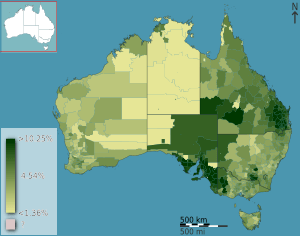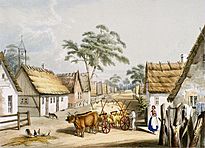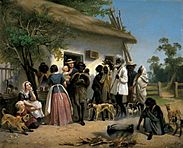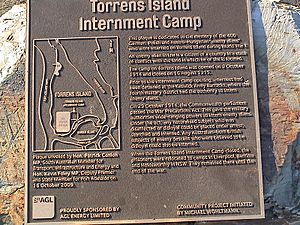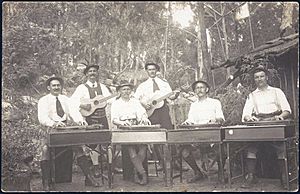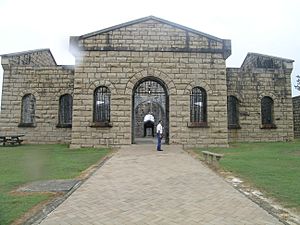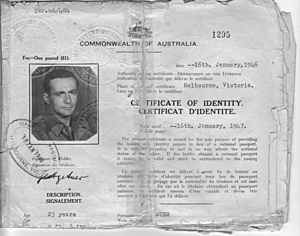German Australians facts for kids
| Total population | |
|---|---|
| German 982,226 (by ancestry, 2016) 108,003 (by birth, 2016) 3.8% of total Australian population. |
|
| Regions with significant populations | |
| South Australia, Western Australia, New South Wales, Victoria, Queensland | |
| Languages | |
| Australian English, German, Barossa German | |
| Religion | |
| Predominantly Lutheranism and Roman Catholicism. |
German Australians (German: Deutsch-Australier) are Australian citizens who have German ancestry. This group is one of the largest ethnic communities in Australia. In 2016, about 982,266 people, or 3.8% of Australians, said they had German roots. It is the fifth most common European background in Australia.
Contents
Who are German Australians?
In 2016, the census showed that 108,000 Australian residents were born in Germany. However, many more people, about 982,266, said they had German ancestry. This number includes people who chose German ancestry alone or with another background. It does not include those who simply said "Australian" as their ancestry.
Most German-born people in Australia live in South Australia and Victoria. They are also more likely to live in country areas than in big cities. Their children, who are German Australians, probably live in similar places.
In terms of religion, German Australians follow different faiths. In 2004, about 21.7% were Catholic, 16.5% were Anglican, and 32.8% were other Christians. About 24.8% said they had no religion.
In 2001, about 76,400 people in Australia spoke German at home. German is the eighth most spoken language in the country. It comes after English, Chinese, Italian, Greek, Arabic, Vietnamese, Spanish, and Tagalog.
A Look at German Immigration to Australia
| Number of arrivals July 1949 – June 2000 |
July 1940 – June 1959 | July 1959 – June 1970 | |
|---|---|---|---|
| Germany | 255,930 | 162,756 | 50,452 |
| Total immigrant arrivals | 5,640,638 | 1,253,083 | 1,445,356 |
| Percentage of immigrants from Germany | 4.5% | 13.0% | 3.5% |
Germans have been part of Australia's story since 1788. This was when Europeans first settled the continent. At least 73 Germans arrived in Australia as convicts.
German Settlers in the 1800s
Until the 20th century, Germans were the largest group in Australia who did not speak English.
Early German Lutherans
The first big group of Germans arrived in South Australia in 1838. This was soon after the British started their colony there. These "Old Lutherans" came from a part of Prussia called Brandenburg. They wanted to keep their traditional faith. They got help to move from George Fife Angas. Not all Germans who came later had the same religious reasons. But the Lutheran Church was very important to German settlers for a long time.
The Forty-Eighters
The "Forty-Eighters" were people who took part in or supported the European Revolutions of 1848. Many of them moved away because of these revolutions. After the "March Revolution" failed in Germany, many Germans came to Australia.
German Australians in the 1900s
By 1900, Germans were the fourth largest European group in Australia. They were behind the English, Irish, and Scots. By 1914, there were about 100,000 German Australians. This number included people born in Germany and their children and grandchildren born in Australia.
During both World Wars, Germans in Australia were sometimes seen as an "enemy within." Some were sent to special camps or sent out of the country. German schools were closed, and the German language was banned in government schools. Many German place names were changed. To avoid problems, many German Australians changed their names to sound more English or French.
After the Second World War, many German displaced persons came to Australia. They were a big part of Australia's new immigrants after the war. In the 1950s and 1960s, more Germans came to Australia. The Australian Government helped them move here. By July 2000, Germany was the fifth most common birthplace for new settlers in Australia.
World War I and Internment Camps
During World War I, the Australian Army ran special camps called internment camps. Old prisons like those in Berrima and Trial Bay Gaol were used first.
The biggest camp was the Holsworthy Internment Camp near Sydney. There were also camps in other states like Queensland, Victoria, Western Australia, and South Australia. About 7,000 people were held in these camps during World War I. This included about 4,500 Germans and British people of German background. Many of these people had lived in Australia for a long time. About 4.5% of all German Australians were held in these camps.
One large camp was at Trial Bay Gaol. It held German naval officers and soldiers. It also held German and Austrian business people and wealthy residents. These people were thought to be supporting the enemy. The camp opened in August 1915 and held up to 580 men. Prisoners could swim, fish, sunbathe, and play tennis. They even had their own orchestra and newspaper. They built a monument for four Germans who died there.
Some Australians thought the prisoners were treated too well. But the prisoners were always watched, and their mail was checked. They could not contact people outside the camp or in other camps.
After the war, the camps closed. Most of the people held there were sent back to Germany. German immigration to Australia was allowed again in 1925.
World War II and Internment
In World War I, most people in the camps were of German heritage. But in World War II, many Italians and Japanese people were also held. People from over 30 different countries were interned, including women and children. Some were Australian residents, and others were captured overseas and brought to Australia.
The internment camps in World War II had three main purposes:
- To stop residents from helping Australia's enemies.
- To calm public fears.
- To house people captured overseas.
All Japanese people were immediately interned. Germans and Italians were sent to camps after war crimes by Nazi Germany and Italy were known. This was especially true for those living in northern Australia, where an enemy invasion was feared. More than 20% of Italians in Australia were held in camps. In total, about 7,000 people with enemy connections were interned. In 1942, the camps were at their busiest, holding 12,000 people.
Tourism and Education
Australia has always been a popular place for German tourists and students to visit.
There are also German international schools in Australia:
- German International School Sydney
- Deutsche Schule Melbourne
German Australian Culture
The Australian wine industry was started by German settlers in the 1800s.
The Goethe-Institut is a German cultural organization. It has branches in Melbourne and Sydney. They help share German culture and language in Australia.
German Missionaries
Many German missionaries came to Australia. They set up mission stations and worked with Aboriginal Australians. In some cases, they helped to save Aboriginal languages and culture.
- 1838: Rev. Clamor Wilhelm Schürmann and Christian Gottlob Teichelmann ran the Pirltawardli Native Location in Adelaide. They learned the local Kaurna language and taught the Kaurna people in their own language. Their work helped bring the language back in the 21st century.
- 1892: Carl Strehlow was an anthropologist and linguist. He worked at two Lutheran missions: Killalpaninna Mission in South Australia and Hermannsburg, Northern Territory. His wife, Frieda Strehlow, also worked with him.
- 1901: German Pallotine missionaries took over the Beagle Bay Mission in Western Australia.
- La Grange Mission at Bidyadanga (1955/6–1985) was run by Thomas Bachmair. This mission focused on respecting local customs.
Missions Started by Germans
- Killalpaninna Mission (1866 – 1915): Started by Johann Friedrich Gößling and Ernst Homann.
- Hermannsburg, Northern Territory (1877 – 1982?): Started by A. Hermann Kemp and Wilhelm F. Schwarz.
- Aurukun Mission (1904 – 1913): Originally Archer River Mission Station, Queensland. Started by Moravians Rev. Arthur Richter and his wife Elisabeth.
- Bathurst Island Mission (1911 – 1978): Started by Francis Xavier Gsell.
- La Grange Mission at Bidyadanga (1955/6–1985).
Famous Australians with German Roots
| Name | Born | Description | Connection to Australia | Connection to Germany |
|---|---|---|---|---|
| Eric Abetz | 1958 | Australian Senator | Moved to Australia from Germany in 1961 | Born in Germany |
| Eric Bana | 1968 | Australian Actor | Born in Australia | German mother |
| Gerard Brennan | 1928 | Judge and retired Chief Justice of Australia (1995–1998) | Born in Australia | German mother's family |
| Heinz Arndt | 1915 | Economist | Moved to Australia | Born in Germany |
| Adam Bandt | 1972 | Politician | Born in Australia | German ancestry |
| Shaun Berrigan | 1978 | Rugby League player | Born in Australia | German ancestry |
| Henry Bolte | 1908 | Politician (Premier of Victoria) | Born in Australia | German ancestry |
| Dieter Brummer | 1976 | Soap opera actor | Born in Australia | German ancestry |
| Ernest Burgmann | 1885 | Anglican bishop and social justice activist | Born in Australia | German ancestry |
| Meredith Burgmann | 1947 | Politician (Australian Labor Party) | Born in Australia | German ancestry |
| Wolfgang Degenhardt | 1924 | Artist | Moved to Australia | Born in Germany |
| Carl Ditterich | 1945 | Australian rules footballer | Born in Australia | German ancestry |
| Scott Drinkwater | 1997 | Rugby League player | Born in Australia | German ancestry |
| Andrew Ettingshausen | 1965 | Rugby League player | Born in Australia | German ancestry |
| Brad Fittler | 1972 | Rugby League player | Born in Australia | German ancestry |
| Harry Frei | 1951 | Cricketer | Moved to Australia | Born in Germany |
| Johannes Fritzsch | 1960 | Conductor | Works and lives in Australia | Born in Germany |
| Gotthard Fritzsche | 1797 | Lutheran pastor | Moved to Australia | Born in Germany |
| Ken Grenda | Businessman and philanthropist | Born in Australia | German ancestry | |
| Michael Grenda | 1964 | Olympic cyclist | Born in Australia | German ancestry |
| Andre Haermeyer | 1956 | Politician (Australian Labor Party) | Moved to Australia | Born in Germany |
| Heinrich Haussler | 1984 | Cyclist | Born in Australia | German ancestry |
| George Heinz | 1891 | Australian rules footballer | Born in Australia | German ancestry |
| Hans Heysen | 1877 | Landscape artist | Moved to Australia | Born in Germany |
| Ben Hilfenhaus | 1983 | Cricketer | Born in Australia | German ancestry |
| Bert Hinkler | 1892 | Aviator | Born in Australia | German ancestry |
| Hermann Homburg | 1874 | Politician | Born in Australia | German ancestry |
| August Kavel | 1798 | Lutheran pastor | Moved to Australia | Born in Germany |
| Kristina Keneally | 1968 | Politician (Premier of New South Wales) | Moved to Australia from the United States | German ancestry |
| Ulrike Klein AO | 1943 | Businesswoman, philanthropist, horticulturalist and botanist | Moved to Australia | Born in Germany |
| David Klemmer | 1993 | Rugby league player | Born in Australia | German ancestry |
| David Koch | 1956 | Television presenter | Born in Australia | German ancestry |
| Gerard Krefft | 1830 | Zoologist and palaeontologist | Moved to Australia | Born in Germany |
| Sonia Kruger | 1965 | Television presenter, media personality and dancer | Born in Australia | German ancestry |
| Dichen Lachman | 1982 | Actress and producer | Raised in Adelaide, Australia | Born in Kathmandu, Nepal, to a German-Australian father |
| Ludwig Leichhardt | 1813 | Explorer | Moved to Australia | Born in Germany |
| Darren Lehmann | 1970 | Cricketer | Born in Australia | German ancestry |
| Carl Linger | 1810 | Composer | Moved to Australia | Born in Germany |
| Stewart Loewe | 1968 | Australian rules footballer | Born in Australia | German ancestry |
| Baz Luhrmann | 1962 | Film director, screenwriter, producer, and actor | Born in Australia | German ancestry |
| Bertha McNamara | 1853 | Socialist and feminist | Moved to Australia | Born in Germany |
| John Monash | 1865 | Australian General | Born in Australia | German (Jewish) Parents |
| Ferdinand von Mueller | 1825 | Botanist, geologist and physician | Moved to Australia | Born in Germany |
| David Neitz | 1975 | Australian rules footballer | Born in Australia | German ancestry |
| Nadine Neumann | 1975 | Olympic swimmer | Born in Australia | German ancestry |
| Hubert Opperman | 1904 | Cyclist and politician | Born in Australia | German ancestry |
| Annastacia Palaszczuk | 1969 | 39th Premier of Queensland | Born in Australia | German ancestry |
| Arthur Phillip | 1738 | First Governor of New South Wales | Served in NSW 1788–1792 | German father |
| Ingo Rademacher | 1971 | Soap opera actor | Moved to Australia | Born in Germany |
| Jack Riewoldt | 1988 | Australian rules footballer | Born in Australia | German ancestry |
| Nick Riewoldt | 1982 | Australian rules footballer | Born in Australia | German ancestry |
| Michael Rolfe | 1962 | Australian rules footballer | Born in Australia | German ancestry |
| Hermann Sasse | 1895 | Lutheran theologian | Moved to Australia | Born in Germany |
| Chris Schacht | 1946 | Politician (Australian Labor Party) and mining company director | Born in Australia | German ancestry |
| Manfred Schaefer | 1943 | Football (soccer) player | Moved to Australia | Born in Germany |
| Jessicah Schipper | 1986 | Olympic swimmer | Born in Australia | German ancestry |
| Melanie Schlanger | 1986 | Olympic swimmer | Born in Australia | German ancestry |
| Mark Schwarzer | 1972 | Football (soccer) player | Born in Australia | German ancestry |
| Emily Seebohm | 1992 | Olympic swimmer | Born in Australia | German ancestry |
| Anthony Seibold | 1974 | Rugby league coach | Born in Australia | German ancestry |
| Gert Sellheim | 1901 | Artist | Moved to Australia | Born in Estonia to ethnically-German parents |
| Wolfgang Sievers | 1913 | Photographer | Moved to Australia | Born in Germany |
| Christian Sprenger | 1985 | Olympic swimmer | Born in Australia | German ancestry |
| Carl Strehlow | 1871 | Lutheran missionary | Moved to Australia | Born in Germany |
| Ted Strehlow | 1908 | Anthropologist | Born in Australia | German ancestry |
| Matthias Ungemach | 1968 | Olympic rower | Moved to Australia | Born in Germany |
| Michael Voss | 1975 | Australian rules footballer | Born in Australia | German ancestry |
| Shane Warne | 1969 | Cricketer | Born in Australia | German mother |
| Chris Watson | 1867 | Prime Minister of Australia | Moved to Australia | Born in Chile to ethnically-German father |
| Shane Webcke | 1974 | Rugby League player | Born in Australia | German ancestry |
| Judith Zeidler | 1968 | Olympic rower | Moved to Australia | Born in Germany |
| Markus Zusak | 1975 | Writer | Born in Australia | German ancestry |
 | Dorothy Vaughan |
 | Charles Henry Turner |
 | Hildrus Poindexter |
 | Henry Cecil McBay |


